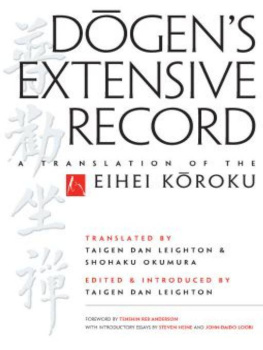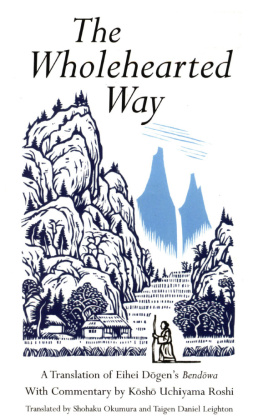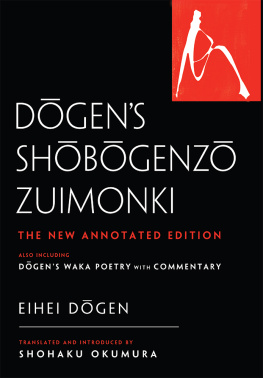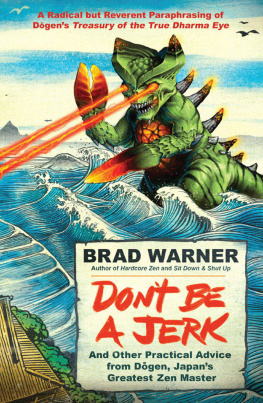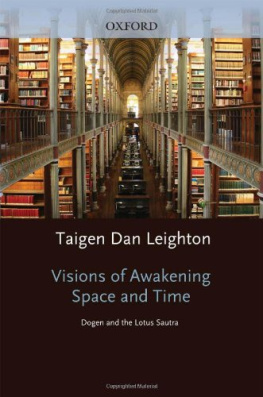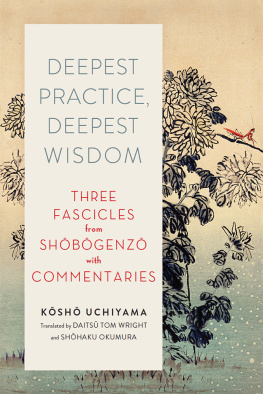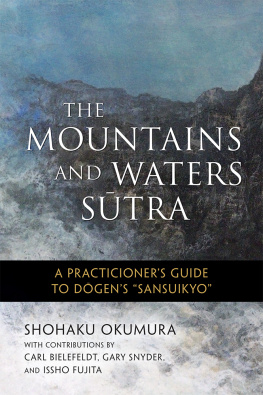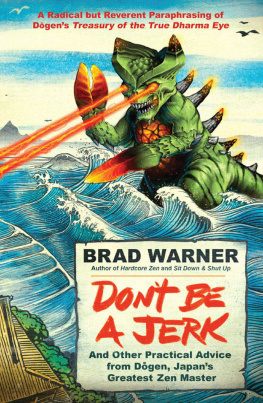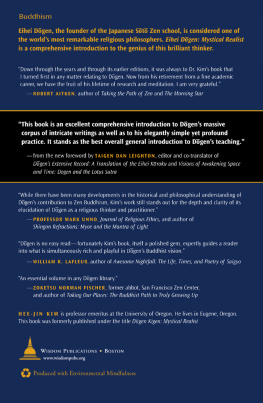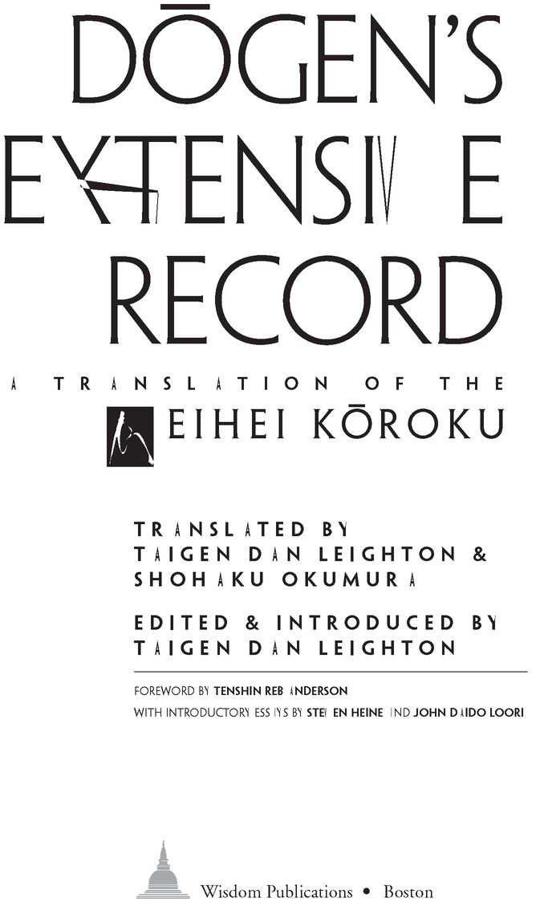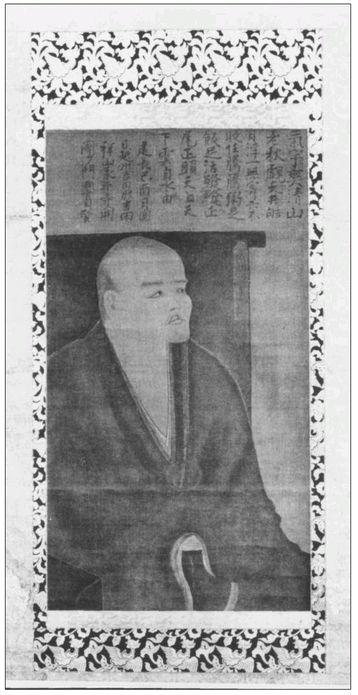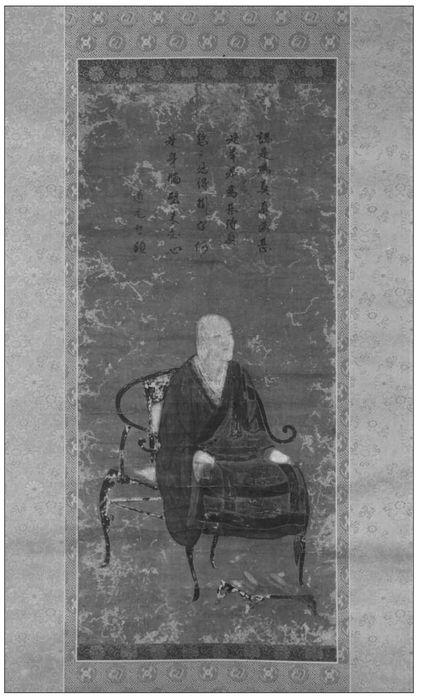Table of Contents
PRAISE FOR DGENS EXTENSIVE RECORD
We owe a great debt to Taigen Dan Leighton and Shohaku Okumura for this monumental translation.
Inquiring Mind
The years of dedicated work that produced this book will be much appreciated by all of us now and in the future who value Dgens inspired writing and talks.Mel Weitsman, abbot of Berkeley Zen Center
Leighton and Okumuras translation of Dgens Extensive Record is a valuable contribution to the growing body of Zen literature available in English. It allows Western readers to discover a new side of Dgen, the side he presented to his own students on a daily basis. It will reward careful study.William Bodiford in Buddhadharma
Portrait of Dgen at Hkyji (verse 3 on page 602 refers to this portrait)
Portrait of Dgen at Eiheiji (verse 10 on page 605 refers to this portrait)
PUBLISHERS ACKNOWLEDGMENT
THE PUBLISHER GRATEFULLY ACKNOWLEDGES the kind help of the Hershey Family Foundation in sponsoring the publication of this book.
FOREWORD
THERE IS A PRINCIPLE in Zen Buddhism that for our practice to be alive and relevant to the actual problems of our current suffering as sentient beings, we must go beyond the previous ways the tradition has gone beyond itself. Here in this wonderful translation of the Extensive Record, we have a separate transmission that goes beyond the Zen tradition of separate transmissions beyond the Buddhist scriptures. Now, thanks to the great and loving efforts of two devoted students of Eihei Dgen, we are challenged by this vast pile of precious records from our brilliant ancestor. These are records of his repeated attempts to free his self-expression from the Chinese Zen tradition of trying to leap free of the Buddhist tradition. In the face of this tradition, how are we going to study this oceanic record without damaging the living spirit that brings us to this text in the first place? One possibility would be to close the book now. But if we avoid reading it, how will we develop our skill as escape artists? On the other hand, if we do read and study these dusty old records, how will we avoid becoming like Huangbos dreg slurpers?
In reading this text, we can see how our Lofty Ancestor ingested, transformed, and became a new expression of his own Dharma nourishment. We can observe how his study chews up the records of his own ancestors and completely or incompletely digests them. We can see how his process of meditative digestion turns the old stories of the tradition into warmth, Dharma protein, and waste products. Or do we suppose that the Ancestor is so great that he completely burns up the tradition, with no waste products?
If we just sit by and watch while not participating in the dynamic way that Dgen leaves the tradition behind in the dust, the dust will engulf our present generation. We must gratefully receive these records into the furnace of the ancestors samdhi and let them be completely burned up, thus giving off their great sweetness and light.
The cooking of the ancestors samdhi is demonstrated on every page of the Vast Record of Eihei. For example, in Dharma hall discourse 503 of this marvelous translation, we hear that a monk asked the great Chinese master Yunmen, What is Buddha? Yunmen then stands on the Buddhas shoulders, leaps, and says, A dried piece of shit. Then Dgens master, Tiantong Rujing, going beyond Yunmen, composed a verse saying:
Yunmen took a shit from the opposite end,
Upsetting Gautama, like an acupuncture needle in a painful spot.
We need to see the ocean dried up clear to the bottom,
To know the person dead, without remaining mind.
Then our great Japanese ancestor, going beyond his master, says:
Today, I, Eihei, would like to continue this rhyme:
How could myriad activities lead to this careless nature?
When Buddha was sick, Jvaka offered a needle.
Even if we see the ocean dried up without any bottom,
Who can clarify the person dead, without a mind remaining?
Now its our turn. Do we have a fresh needle to offer? Are we in the West ready to enter this process and make our contribution to this tradition of transcendence of tradition?
Out of deep gratitude for our living tradition, I am not going to study this text any further without wholeheartedly vowing with each reading to express myself in such a way as to stand on the shoulders of this record and leap beyond it, thereby beginning to repay the boundless kindness and compassion that has gone into its creation, preservation, and new translation. How about you? Will you join me in this vow to thoroughly study and continuously refresh this tradition of endless transcendence?
Nine bows,
TENSHIN ZENKI REB ANDERSON
Senior Dharma Teacher and former Abbot
of San Francisco Zen Center
INTRODUCTION
TAIGEN DAN LEIGHTON
Overview of Dgens Teaching Career
IN 1227 the Japanese monk Dgen (1200-1253) returned to Japan from four years of study in China. During his remaining twenty-five years he composed an extraordinary volume of writings, now widely prized for their philosophical profundity, poetic virtuosity, and subtle, evocative wordplay. Dgen is remembered as the founder of the St branch of Japanese Zen. But he disdained sectarian labels, saying that Zen was an extremely foolish name and that if you use the name Zen School you are not descendants of buddha ancestors, and also have poisonous views. Nevertheless, in the long history of what is now considered the Zen tradition, no master has left a legacy of writings as voluminous and comprehensive, in so many aspects of teaching and practice, as Eihei Dgen. Although he was a medieval monk born eight centuries ago, his writings about time, space, Buddha nature, and the subtle character of spiritual pursuit and realization are now widely esteemed by contemporary philosophers, physicists, poets, environmentalists, and religious thinkers and practitioners. His writings can be baffling and intensely challenging but also inspiring and deeply comforting. This work of Dgens, Eihei Kroku, or Dgens Extensive Record, is one of his great collections of wisdom and insight, but it also reveals the unique kindness, authority, wit, and personality he displayed while training his disciples, who successfully sustained his teaching and practice.
Dgens earliest writing, his first declaration of awakening, was Fukanzazengi (Universally Recommended Instructions for Zazen), written after he returned from China to the Kenninji monastery in Kyoto in 1227. It proclaims the value, power, wonder, and accessibility of zazen, or seated meditation, the primary practice that Dgen advocated throughout his life. The earliest version of this text is no longer extant, but a later version is included at the end of volume 8 in this book.
Aside from the substantial legacy of Dgens own writings, much remains uncertain about the historical facts of his life. The first substantial biography of Dgen, titled Kenzeiki, was not written until the fifteenth century and remained unpublished for another couple of centuries. Much of it might well be considered sectarian hagiography. But we know that Dgen was born into high aristocracy in the ancient capital of Kyoto and that he was a precocious, highly intelligent child. According to the legendary account, he first decided to enter the spiritual life at the age of seven, after experiencing a deep realization of impermanence while watching the incense smoke rising at his mothers funeral. Five years later he became a monk in the Tendai school, one of the two dominant branches of Japanese Buddhism at the time, which had its headquarters, Enryakuji temple, on Mount Hiei on the northeast edge of Kyoto. Sometime between the age of fourteen and seventeen, for unclear reasons, Dgen left Mount Hiei and went to practice at Kenninji, the first Zen monastery in Japan.

